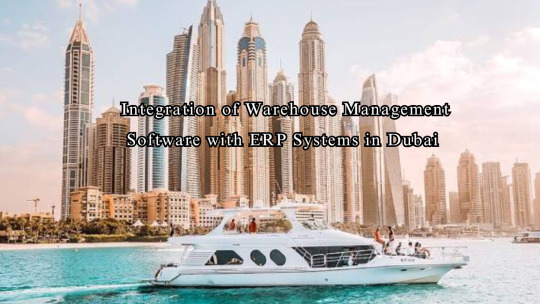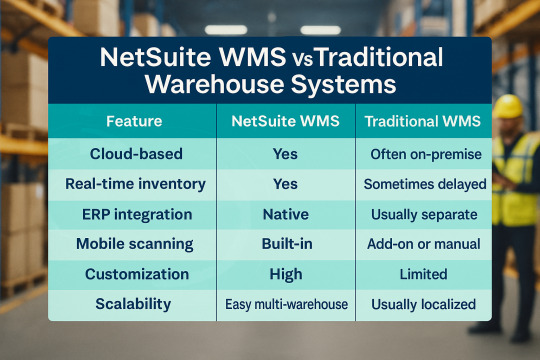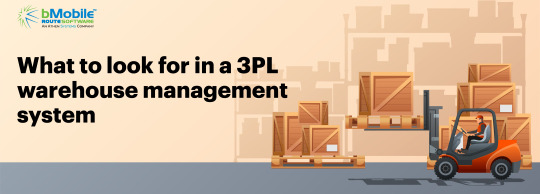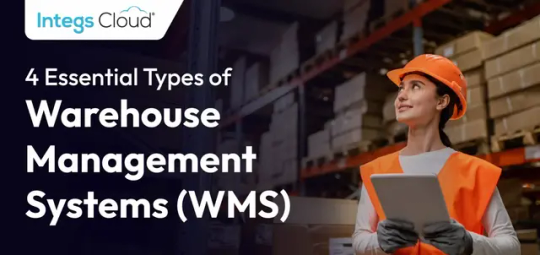#WMS+ netsuite
Explore tagged Tumblr posts
Text
WMS+ NetSuite
Implementing WMS+ NetSuite
A. Steps to integrate WMS with NetSuite
implementing WMS and NetSuite integration requires careful planning and execution.
WMS+ NetSuite
B. Fine practices for a seamless implementation
Drawing from successful implementations, we define first-class practices that organizations should observe to ensure a smooth integration method.
C. Case research illustrating a hit integration
real-international examples of organizations that have effectively implemented WMS+ NetSuite integration spotlight the sensible advantages and show off the transformative effect on operational efficiency.
Overcoming challenges
A. Addressing capacity hurdles in integration
notwithstanding the numerous benefits, companies may also face demanding situations for the duration of the combination system.
B. strategies to mitigate risks and make sure success
Mitigating risks is critical for a a success integration. We define proactive techniques that agencies can adopt to reduce dangers and make sure the seamless operation of incorporated systems.
C. real-world examples of groups overcoming demanding situations
examining how numerous organizations navigated and overcame challenges of their WMS+ NetSuite integration provides treasured insights for organizations embarking on a similar journey.
Future tendencies in WMS+ NetSuite Integration
A. Technological upgrades shaping integration
The panorama of WMS and NetSuite integration is always evolving. We explore rising era which can be influencing the aggregate place and shaping the destiny of deliver chain control.
B. How corporations can stay earlier of the curve
Staying abreast of technological upgrades is critical for businesses aiming to hold a aggressive component.
C. growing technology influencing the landscape
From artificial intelligence to blockchain, we delve into the rising era which are poised to effect WMS+ NetSuite integration, presenting a glimpse into the future of integrated structures.
Case research
A. success memories of groups the use of WMS+ NetSuite
analyzing actual-worldwide achievement tales showcases the tangible advantages organizations have professional through WMS+ NetSuite integration. those case research spotlight efficiency profits, fee monetary savings, and improved patron delight.
B. effect on overall performance, fee financial savings, and patron pleasure
Quantifying the impact of WMS+ NetSuite integration on efficiency, price monetary financial savings, and purchaser delight reinforces the value of this protected solution for businesses at some stage in awesome industries.
C. Lessons found out from special industries
getting to know from the tales of numerous industries sheds mild at the commonplace schooling and insights received from WMS+ NetSuite integration, presenting precious takeaways for businesses thinking about adoption.
Hints for deciding on the right WMS and NetSuite solutions
A. Key elements to recollect in the selection gadget
selecting the right WMS and NetSuite answers is critical for a a success integration. We outline key elements that agencies have to don't forget even as deciding on these systems.
B. Customization alternatives and scalability
The capability to customise and scale WMS and NetSuite answers steady with commercial enterprise desires is crucial. We talk the significance of flexibility in assembly evolving company requirements.
C. Importance of dealer guide and updates
Ongoing seller guide and regular updates are important for the finest standard overall performance of included systems.
1 note
·
View note
Text
WMS+ for NetSuite | WMS+ NetSuite
Optimize every pass: reduce mistakes, accelerate choosing and packing, and growth visibility with actual-time inventory and technique control.
Seamless Integration: built for NetSuite, WMS+ seamlessly integrates along with your current ERP, disposing of data silos and streamlining workflows.
Scalability on demand: develop your commercial enterprise without growing pains. WMS+ scales effortlessly to fulfill your converting wishes, whether or not you're a small startup or a worldwide organisation.
WMS+ for NetSuite
Mobile personnel Empowerment: provide your warehouse personnel the gear they want to be successful. WMS+ empowers them with cellular gadgets and intuitive interfaces, setting records and control at their fingertips.
Greater Visibility and control: benefit real-time insights into your stock, orders, and warehouse performance. Make statistics-pushed choices and optimize your operations for top efficiency.
WMS+ is greater than just a warehouse control device. it's a whole warehouse optimization platform that empowers you to:
Reduce errors: eliminate selecting and packing errors with barcode scanning and clever routing.
Boom selecting speed: Optimize picking paths and workflows for faster order success.
Enhance inventory Accuracy: maintain real-time inventory tiers and cast off stockouts with cycle counts and bin places.
Reduce exertions prices: Streamline methods and automate obligations to lessen manual paintings and improve productiveness.
Scale with confidence: without problems adapt WMS+ on your evolving needs, whether or not you add new places or make bigger your product traces.
call to movement:
ready to take your warehouse to the next level? touch us nowadays for a free demo and see how WMS+ for NetSuite can rework your operations.
Additional Information:
Include testimonials from glad NetSuite and WMS+ clients.
show off the key features of WMS+ with screenshots or videos.
Spotlight the blessings of cloud-primarily based WMS as compared to on-premise solutions.
Offer a loose trial or demo to let potential clients revel in WMS+ firsthand.
0 notes
Text
NetSuite (WMS) Warehouse Management System | NetScore
Technologies NetScore WMS Mobile For NetSuite brings the power of barcode technology to wholesale distribution and manufacturing companies.
https://bit.ly/3xokfkp
#warehouse management solutions#warehouse management system#wms mobile for netsuite#inventory tracking barcode system#barcode scanner for warehouse inventory
0 notes
Text
Integration of Warehouse Management Software with ERP Systems in Dubai

In today's fast-paced and digitally-driven business environment, companies in Dubai are continuously looking for ways to enhance operational efficiency, reduce costs, and improve customer satisfaction. One significant step towards achieving these goals is the integration of Warehouse Management Software (WMS) with Enterprise Resource Planning (ERP) systems.
This integration is not just a trend—it's a necessity for companies seeking seamless business operations, especially in logistics-heavy sectors like retail, manufacturing, distribution, and e-commerce. Let’s explore why this integration matters and how it benefits businesses in Dubai.
Why Integration Matters
Warehouse Management Software handles the day-to-day operations of a warehouse: inventory tracking, receiving, picking, packing, and shipping. ERP systems, on the other hand, manage broader business functions—accounting, sales, procurement, HR, and more. When these systems operate in silos, data inconsistency and communication gaps can occur, leading to delays, errors, and increased costs.
Integrating WMS with ERP allows for real-time data flow between warehouse operations and other departments. This ensures that every part of the business works with up-to-date, accurate information.
Key Benefits of Integration in the Dubai Market
1. Enhanced Inventory Visibility
Dubai’s retail and distribution sectors rely heavily on real-time inventory insights. Integration ensures that stock levels, item locations, and movement data are always synchronized between the warehouse and business management systems.
2. Improved Order Accuracy
With integrated systems, order information flows directly from the sales module of the ERP to the warehouse, reducing the risk of picking and shipping errors. This leads to faster fulfillment and higher customer satisfaction.
3. Streamlined Supply Chain
Dubai serves as a key logistics hub in the Middle East. Integration helps businesses manage complex supply chains more efficiently by providing centralized control over purchasing, warehousing, and distribution.
4. Faster Decision Making
Real-time reporting and analytics across both systems allow management to make data-driven decisions quickly—critical in the highly competitive Dubai market.
5. Regulatory Compliance
With the UAE's strict VAT and import/export regulations, integrated systems help ensure accurate record-keeping and compliance with legal requirements.
Industries in Dubai Benefiting from WMS-ERP Integration
Retail & E-commerce: To handle rapid order processing and same-day delivery demands.
FMCG & Distribution: For accurate stock control and automated replenishment.
Construction & Building Materials: For managing large inventories across multiple warehouses.
Pharmaceuticals: To ensure regulatory compliance and traceability.
Choosing the Right Integration Approach
Businesses in Dubai should work with software providers who offer customizable, scalable integration options. Whether through API-based connections, middleware solutions, or native integrations, the goal is to ensure smooth, uninterrupted data flow.
Some popular ERP platforms used in Dubai (like SAP, Microsoft Dynamics, and Oracle NetSuite) offer plug-and-play integrations with advanced WMS systems, reducing the need for custom development.
Conclusion
The integration of Warehouse Management Software Dubai with ERP systems is a game-changer for businesses in Dubai. It aligns warehouse operations with broader business goals, drives efficiency, and enhances customer service. As Dubai continues to grow as a global trade and commerce hub, investing in integrated digital solutions is no longer optional—it's essential for long-term success.
0 notes
Text
Warehouse inefficiencies can quietly erode profits — slow fulfillment, stockouts, manual errors. That’s where NetSuite’s Warehouse Management System (WMS) steps in as a real logistics game-changer.

In our latest blog at TechlyCodes, we break down how NetSuite WMS is transforming logistics through: ✔️ Real-time inventory visibility ✔️ Smart mobile picking & barcode scanning ✔️ Deep ERP integration ✔️ Scalable multi-location warehouse management ✔️ Automation that actually saves time
Whether you’re running e-commerce, wholesale, or manufacturing — if logistics is your backbone, this is a must-read.
#NetSuite #WarehouseManagement #WMS #ERP #Logistics #BusinessAutomation #WarehouseOptimization #InventoryManagement #TechlyCodes #NetSuiteExperts #ERPConsulting #CloudERP
0 notes
Text
QuickMove Logistics Inventory App versus NetSuite WMS: What Logistics Inventory Operation Requires
As logistics continues to transform, an effective warehouse management system (WMS) becomes necessary for effective operations, accuracy of inventory, and improved customer care. Most organizations seek a logistics inventory app that can automate warehouse management, monitoring, and operational efficiency. Some of the market's popular choices include the QuickMove Logistics Inventory App and NetSuite WMS. Although both systems provide inventory management features, QuickMove is the most suitable for logistics businesses because of its industry-specific functionality, affordability, and user-friendliness.
Feature Comparison: QuickMove Logistics Inventory App vs.NetSuite WMS
QuickMove and NetSuite WMS share warehouse operation, inventory tracking, and automation functionality but with differences in emphasis and use.
Industry Focus and Usability
NetSuite WMS is a level-enterprise warehouse management system, and it is used by several industries, such as retail, manufacturing, and distribution. Although it does offer sophisticated inventory tracking, warehouse mapping, and supply chain integration, it must be heavily customized quite a lot in order to support logistics operations. In comparison, QuickMove Logistics Inventory App is specifically designed for logistics businesses such as freight forwarders, moving companies, and warehousing businesses. With its industry-specific design, it is even more suited to logistics businesses that require customized solutions without unnecessary complexity.
Ease of Implementation and User Experience
Implementation complexity is one of the biggest issues logistics companies have to contend with once they implement a WMS. NetSuite WMS involves great levels of configuration, third-party integrations, and technical expertise, leading to a longer onboarding process with a high price tag. Still, QuickMove Logistics Inventory App is a plug-and-play application simply installed with minimal effort. Its straightforward, easy design allows warehouse workers, drivers, and managers to quickly understand and use the system with little training needed.
Inventory Management and Real-Time Tracking
QuickMove's logistics inventory app gives instant monitoring of commodities, warehouse quantities, and movement of stock. It enables companies to manage inventory in various locations effectively and provides barcode scanning, auto reminders, and cloud storage for real-time monitoring. NetSuite WMS also includes inventory management, though its capabilities are biased towards large organizations with complex supply chain needs and therefore less appropriately geared to small and medium-sized logistics businesses.
Delivery and Goods Transit Management
Another notable feature of QuickMove is its delivery and goods transit and management. The app allows business firms to track delivery notes, log movement of goods, and capture digital proof of delivery, including customer and crew signatures as well as date and place details. This function is crucial in logistic operations as it eradicates paperwork and ensures accountability. NetSuite WMS is more aimed at internal warehouse processes than external logistics workflows, which makes it less effective for companies needing end-to-end logistics monitoring.
"Cost-Effectiveness and Scalability"
Cost is a very important consideration in selecting a warehouse management system. NetSuite WMS is a high-end solution with a high subscription cost, implementation fee, and additional charges for customization and integration. While it has rich features, its pricing model makes it ideal for big businesses with fat wallets. On the contrary, QuickMove Logistics Inventory App offers an affordable solution made exclusively for small and medium-scale logistics companies. Its subscription-based approach provides businesses with the ability to utilize the features they require without having to pay additional for functionalities that may not be required by them.
Customization and Flexibility
QuickMove has the logistics-specific customization features so that companies can re-engineer processes, automate, and integrate with installed ERP and transportation management software. NetSuite WMS, as highly customizable, entails heavy development effort and customization fees over and above the initial cost. This positions QuickMove as a more versatile solution for logistic businesses that have to adapt quickly.
Why QuickMove Logistics Inventory App is the Ideal Choice
1. Configured for Logistics Operations: Compared to NetSuite WMS, which can apply to multiple types of industries, QuickMove has been designed specially for logistics businesses, so everything is relevant and useful.
2. Quicker Deployment: Plug-and-play installation enables organizations to implement QuickMove quickly, reducing downtime and improving efficiency.
3. Mobile-Friendly and Cloud-Based: The logistics industry requires real-time information and mobile connectivity. QuickMove offers easy mobile functionality, with warehouse managers and drivers being able to update stock and deliveries while on the move.
4. Comprehensive Reporting: QuickMove delivers detailed reports with timestamps, signatures, and real-time status updates, enabling simple tracking of warehouse performance and inventory movement.
5. Affordable and Scalable: As a small logistics business or a small business growing its operations, QuickMove has affordable pricing that won't sacrifice basic functionalities.
Conclusion: The Best Logistics Inventory App for Your Business
To those logistics businesses that require an inexpensive, basic, and effective logistics inventory app, QuickMove Logistics Inventory App is the solution to NetSuite WMS. Although NetSuite WMS on its own is an effective computer program for bulk businesses, it would probably end up being too costly and cumbersome to use for logistics businesses. QuickMove, apart from providing industry-specific features, real-time tracking, support for mobility, and basic inventory management, provides maximum value to the logistics businesses. https://www.quickmovetech.com/digital-logistics-inventory-app/
0 notes
Text
E-Invoicing in Logistics: The Shift to Paperless Transactions
In today’s digital era, logistics management software is transforming how businesses handle operations, and one of the biggest game-changers is e-invoicing software for logistics businesses. Traditional invoicing, with its reliance on paper, manual entries, and delayed approvals, is rapidly becoming obsolete. With cloud-based e-invoicing solutions, freight forwarders, transporters, and warehouse managers can streamline invoicing, enhance compliance, and accelerate cash flow—all while reducing costs and errors.
Why Logistics Companies Need E-Invoicing
Logistics companies handle a high volume of invoices daily, often involving multiple stakeholders, currencies, and regulations. Freight forwarding software with e-invoicing integration helps businesses eliminate delays and errors associated with manual invoicing.
With automated invoicing software, logistics businesses can:
Reduce Paperwork – Eliminate physical invoices and digitize the entire process.
Ensure Compliance – Stay aligned with tax laws like ZATCA (Saudi Arabia), GST (India), VAT (EU), and Peppol e-invoicing formats.
Accelerate Payments – Speed up invoice approvals and reduce payment cycles.
Enhance Accuracy – Reduce invoice disputes with AI-driven data validation.
Improve Cash Flow – Real-time tracking ensures better financial planning.
Integrate with ERP & Logistics CRM – Sync invoices seamlessly with existing TMS, WMS, and freight software.
Key Benefits of E-Invoicing Software for Logistics Businesses: -
1. Faster Payment Processing & Cash Flow Management
Delayed payments are a major challenge in logistics. AI-powered e-invoicing software automatically generates invoices, verifies data, and sends them instantly for approval. Automated payment reminders further reduce outstanding dues, improving overall cash flow.
2. Compliance with Tax & Regulatory Standards
Many countries now mandate e-invoicing for businesses. Whether it’s VAT, GST, or ZATCA-compliant e-invoicing, logistics companies need to ensure their software supports legal requirements. Cloud-based logistics ERP software integrates tax calculations and e-invoice generation, minimizing compliance risks.
3. Seamless Integration with Logistics Software
The best freight forwarding software and transport management systems (TMS) come with e-invoicing features, allowing logistics companies to generate digital invoices directly from shipments, freight charges, and delivery data. ERP-integrated e-invoicing solutions sync with financial systems like SAP, QuickBooks, and Oracle NetSuite, ensuring smooth operations.
4. AI & Blockchain-Enabled Security
AI-powered invoice verification prevents fraud and incorrect billing, while blockchain technology in logistics ensures tamper-proof invoice records, reducing invoice disputes and unauthorized modifications.
Final Thoughts
E-Invoicing is not just a digital upgrade—it’s a game-changer for logistics businesses. By leveraging cloud-based freight forwarding software and automated e-invoicing solutions, companies can:
Reduce operational costs
Improve compliance & tax reporting
Enhance cash flow & payment processing
Streamline global freight invoicing
Looking for the best e-invoicing solution for your logistics business?
Book Demo Now
#logistics software#freight software#freight forwarding software#software for freight forwarding software
1 note
·
View note
Text
Maximize operational efficiency and inventory control with VastEdge’s cutting-edge warehouse management system (WMS).
#warehouse management system#WMS software#inventory control tools#logistics optimization#supply chain software
0 notes
Text
What to look for in a 3PL warehouse management system

When selecting a Third-Party Logistics (3PL) warehouse management system (WMS), there are several key factors and features to look for. Here’s a breakdown of important criteria:
1. Core WMS Features
Inventory Management: The ability to track inventory in real time, across multiple locations if needed. It should include features like cycle counting, lot/batch tracking, and expiry date tracking.
Order Management: Supports efficient order processing from multiple sales channels (e.g., e-commerce, retail, wholesale). It should automate order picking, packing, and shipping processes.
Receiving and Putaway: Streamlines the process of receiving goods, assigning storage locations, and managing inbound shipments.
Multi-Client Management: Since 3PLs often handle multiple clients, the system should allow for separate inventories, order tracking, and billing for different customers.
2. Integration Capabilities
ERP, eCommerce, and Marketplace Integration: The system should integrate seamlessly with major ERP systems, e-commerce platforms (e.g., Shopify, Magento), and online marketplaces (e.g., Amazon, eBay) for automated data exchange.
Transportation Management System (TMS) Integration: Having a system that integrates with a TMS is key for coordinating shipping, managing carriers, and optimizing routes.
Accounting Integration: To keep financial operations smooth, integration with accounting software (e.g., QuickBooks, NetSuite) is important.
3. Scalability
The WMS should be able to grow with your business and support expansion into new warehouses, clients, and geographic regions. Cloud-based systems are often more scalable and flexible.
4. Customization and Flexibility
Look for a WMS that allows customization to suit specific operational workflows, client requirements, or industry-specific needs. Flexibility is key for businesses with unique warehouse operations.
5. Advanced Picking and Packing Options
Multi-Order Picking: Capabilities for batch picking, wave picking, and zone picking.
Packing Optimization: Features that help determine the most efficient packing method for reducing shipping costs and space.
6. Automation and Efficiency Tools
RFID & Barcode Scanning: Support for RFID and barcode technology to improve speed and accuracy in inventory management and order fulfillment.
Automated Reporting: The ability to generate customized reports on key metrics like order accuracy, inventory levels, warehouse utilization, and client-specific KPIs.
Robotic Automation: Integration with robotics or automated picking systems if needed for larger or high-volume warehouses.
7. Client Portal
A portal for clients to log in, check their inventory, track shipments, view reports, and place orders. This enhances transparency and client satisfaction.
8. Analytics and Reporting
The system should provide real-time reporting and analytics on key warehouse performance metrics (e.g., order fulfillment rates, inventory accuracy, labor efficiency). These insights are valuable for decision-making and continuous improvement.
9. Labor Management
Tools for labor tracking, task assignments, and monitoring productivity. This is especially important in large-scale warehouses where staff efficiency can directly affect profitability.
10. Security and Compliance
Data Security: Ensure the WMS offers robust security measures such as encryption, user access control, and regular data backups.
Compliance: The system should help meet regulatory requirements, especially if you handle goods in industries like food, pharmaceuticals, or hazardous materials. It should offer features like tracking certifications and compliance reporting.
11. Mobile Accessibility
A mobile-friendly system allows warehouse staff to access key functions (inventory, picking, shipping) from handheld devices, tablets, or mobile scanners, improving flexibility and efficiency on the floor.
12. Cost and ROI
Consider the total cost of ownership, including upfront costs, subscription fees (if cloud-based), and any ongoing maintenance or support costs. It’s also essential to calculate the return on investment (ROI) in terms of labor savings, efficiency improvements, and better customer satisfaction.
13. Support and Training
Ensure the vendor offers comprehensive onboarding, training for warehouse staff, and ongoing customer support. Fast and effective support can reduce downtime in case of issues.
14. User-Friendly Interface
A WMS should be intuitive and easy for staff to use, minimizing the learning curve. Simple navigation and clear functionality can reduce errors and improve speed.
15. Billing and Invoicing Features
For 3PL providers, it’s essential to have automated billing and invoicing features that can account for storage, handling, and shipping charges per client, with support for different pricing models.
By carefully considering these factors, you’ll be better equipped to choose a 3PL WMS that aligns with your business's needs and enhances overall operational efficiency.
Our Software Applications:
Inventory Management Software | Truck Inventory Software | Multi Warehouse Management Software | Fleet Management Software
#bmobileroutesoftware#bmobile#inventorysoftware#inventorymanagementsystem#inventorymanagementsoftware#bmobile route software#inventory software#trending post#bmobileroute#united states
0 notes
Text
Aplikasi Gudang Terbaik untuk Mengoptimalkan Operasional Retail
Mengelola inventaris dalam bisnis retail bisa menjadi tantangan besar, terutama dengan banyaknya volume barang yang dikelola. Untuk mengatasi tantangan ini, aplikasi gudang hadir sebagai solusi efektif untuk mengoptimalkan manajemen stok dan operasional gudang. Berikut adalah beberapa aplikasi gudang terbaik yang dapat membantu bisnis retail Anda:
1. HashMicro HashMicro menawarkan solusi lengkap dengan fitur otomatisasi manajemen inventaris, pelacakan real-time, dan analisis data mendalam. Aplikasi ini cocok untuk berbagai jenis bisnis retail dengan kebutuhan yang kompleks. HashMicro memudahkan sinkronisasi data dan pelaporan yang lebih efisien, sehingga meminimalkan kesalahan manusia dan meningkatkan akurasi inventaris. Dengan fitur pelacakan barang yang mendetail, HashMicro memastikan setiap item di gudang dapat diketahui posisi dan statusnya secara real-time.
HashMicro juga menyediakan integrasi dengan berbagai platform lain seperti ERP dan CRM, memudahkan aliran informasi antar departemen. Selain itu, HashMicro memungkinkan bisnis retail untuk membuat laporan analitis yang membantu dalam pengambilan keputusan strategis. Dengan menggunakan HashMicro, bisnis retail dapat mengurangi biaya operasional dan meningkatkan produktivitas gudang.
2. Netsuite WMS Netsuite WMS menawarkan fleksibilitas tinggi dalam mengelola berbagai jenis produk dan kebutuhan gudang. Fitur-fitur canggih seperti manajemen pesanan otomatis dan pelacakan barang membantu bisnis retail untuk meningkatkan efisiensi operasional mereka. Netsuite WMS juga menyediakan kemampuan analitik yang kuat, memungkinkan Anda menganalisis data stok dan penjualan secara mendalam untuk mengambil keputusan yang lebih baik. Dengan antarmuka yang user-friendly, Netsuite WMS memudahkan staf gudang dalam beradaptasi dan mengelola inventaris dengan lebih efektif.
Netsuite WMS dirancang untuk skala bisnis yang besar dan menyediakan berbagai modul yang dapat disesuaikan dengan kebutuhan spesifik bisnis retail. Integrasi dengan sistem ERP lainnya juga memungkinkan aliran data yang lancar antara departemen, meningkatkan koordinasi dan efisiensi operasional secara keseluruhan.
3. TradeGecko TradeGecko adalah aplikasi gudang berbasis cloud yang memudahkan pengelolaan inventaris, pesanan, dan pelanggan dalam satu platform terintegrasi. Dengan TradeGecko, bisnis dapat mengotomatisasi berbagai proses operasional dan fokus pada pertumbuhan bisnis. Fitur seperti sinkronisasi multi-channel memungkinkan pengelolaan penjualan dari berbagai platform e-commerce dalam satu dashboard, mengurangi kerumitan dan meningkatkan efisiensi.
TradeGecko juga menyediakan laporan analitik yang membantu Anda melacak kinerja penjualan dan tren inventaris. Dengan analisis yang komprehensif, bisnis dapat mengidentifikasi produk yang paling laris dan membuat keputusan pembelian yang lebih baik. Selain itu, TradeGecko menawarkan fleksibilitas dalam mengelola harga dan promosi, sehingga membantu bisnis retail dalam merespons perubahan pasar dengan cepat.
4. Odoo Odoo menawarkan solusi ERP dengan modul manajemen gudang yang komprehensif. Fitur unggulannya termasuk pelacakan inventaris, manajemen pesanan, dan analisis data yang membantu bisnis retail dalam mengambil keputusan berbasis data. Odoo juga menyediakan berbagai modul tambahan yang bisa diintegrasikan, seperti modul CRM, modul penjualan, dan modul pembelian, semuanya terintegrasi dalam satu sistem.
Dengan Odoo, Anda dapat mengelola seluruh operasional bisnis retail dari satu platform yang terpusat. Odoo juga mendukung integrasi dengan berbagai aplikasi pihak ketiga, memberikan fleksibilitas lebih dalam mengelola inventaris dan operasional. Fitur pelaporan yang kuat memungkinkan bisnis retail untuk memantau kinerja secara real-time dan membuat penyesuaian yang diperlukan untuk meningkatkan efisiensi dan profitabilitas.
5. InFlow Inventory InFlow Inventory menyediakan solusi manajemen gudang yang mudah digunakan dengan fitur pelacakan barang, manajemen pesanan, dan laporan inventaris. Aplikasi ini sangat cocok untuk bisnis retail yang membutuhkan solusi sederhana namun efektif. InFlow Inventory memiliki antarmuka yang user-friendly, sehingga mudah digunakan oleh tim gudang tanpa perlu pelatihan intensif.
Fitur lain yang ditawarkan termasuk pelacakan serial number dan batch, yang sangat berguna untuk bisnis retail yang menjual produk dengan masa kadaluarsa atau produk yang memerlukan pelacakan spesifik. Dengan InFlow Inventory, bisnis retail dapat memastikan bahwa semua produk dikelola dengan baik, mengurangi risiko kekurangan stok atau overstocking, dan meningkatkan kepuasan pelanggan.
Mengelola gudang secara efektif dengan menggunakan aplikasi gudang dapat meningkatkan efisiensi operasional dan mengurangi risiko kesalahan manusia. Pemilihan aplikasi yang tepat akan sangat bergantung pada kebutuhan spesifik bisnis Anda. HashMicro, dengan solusi lengkapnya, menawarkan berbagai fitur yang dapat disesuaikan dengan kebutuhan bisnis yang kompleks. Dengan HashMicro, Anda tidak hanya mendapatkan alat yang efisien untuk manajemen gudang, tetapi juga mitra yang berkomitmen untuk membantu Anda mencapai keberhasilan operasional.
0 notes
Text
NetSuit WMS Consulting Services in USA
Entartes Services stands as a premier provider of NetSuite WMS consulting, solutions, and services across the United States. With deep expertise in Warehouse Management Solutions, the company delivers tailored strategies that optimize operations, streamline processes, and drive efficiency in warehousing environments. Leveraging the robust capabilities of NetSuite WMS, Entartes Services helps businesses achieve seamless inventory management, improve order fulfillment accuracy, and enhance overall supply chain performance. Whether it's implementing new systems, fine-tuning existing processes, or providing ongoing support, Entartes Services offers comprehensive solutions designed to meet the unique needs of each client. Their team of seasoned professionals brings a wealth of knowledge and experience to every project, ensuring that businesses can fully harness the power of NetSuite WMS to achieve their operational goals and maintain a competitive edge in the market.
0 notes
Text
OpenTeQ Manufacturing with NetSuite: Revolutionizing the Industry

In the fast-paced world of manufacturing, efficiency and integration are key to staying competitive. NetSuite, with its comprehensive suite of solutions, offers a robust platform that caters to the intricate needs of modern manufacturing businesses. From streamlining operations to enhancing customer relationships, NetSuite’s capabilities are transforming the industry.
Manufacturing ERP & Management Software
Enterprise Resource Planning (ERP) systems are vital for manufacturing companies as they integrate all facets of an enterprise into one complete system. NetSuite’s ERP solution is specifically designed for manufacturing businesses, allowing them to:
Integrate Processes: It offers a unified platform for everything from product development to production, inventory management, and beyond.
Improve Visibility: Manufacturers gain real-time insights into their operations, enabling better decision-making and increased control over the business.
Enhance Efficiency: Automation of core business processes reduces manual work, minimizes errors, and accelerates production cycles.
Scale with Ease: As the business grows, NetSuite’s flexible architecture can scale to meet the increasing demands.
NetSuite Industry Activation
NetSuite Industry Activation speeds up the implementation process for manufacturers. This feature:
Offers Tailored Solutions: It provides pre-built configurations and workflows crafted for the manufacturing sector.
Reduces Setup Time: By utilizing industry best practices, manufacturers can go live with NetSuite faster than ever.
Ensures Industry Compliance: Manufacturers can stay compliant with industry standards and regulations with NetSuite's specific solutions.
NetSuite Solutions for Manufacturing
NetSuite's suite of solutions encompasses various tools that are essential for manufacturing companies, including:
Product Data Management: Centralize product information and lifecycle to streamline the product management process.
Production Management: Schedule, produce, and inspect products more efficiently.
Supply Chain Management: Optimize purchasing and inventory with demand planning.
Order Management: Ensure a smooth flow from sales quote to order fulfillment ensuring customer satisfaction.
Warehouse and Fulfillment: Improve warehouse operations with advanced WMS capabilities.
NetSuite Portals for Manufacturing
NetSuite’s portals enhance the connectivity between manufacturers and their customers, suppliers, and partners. These portals:
Facilitate Communication: Share real-time information across the supply chain, improving collaboration.
Enhance Customer Service: Provide customers with self-service portals for order tracking and support.
Streamline Procurement: Suppliers can access purchase orders, invoices, and payment information.
Conclusion:
OpenTeQ Group Manufacturing ERP & Management Software offers a comprehensive solution tailored to the unique needs of Manufacturing with NetSuite enterprises. With robust features designed to streamline operations, optimize processes, and enhance productivity, it stands as a formidable choice for businesses seeking efficiency and scalability. Additionally, leveraging NetSuite's powerful platform further enhances operational agility, financial visibility, and customer satisfaction. The integration of NetSuite Industry Activation adds another layer of specialization, enabling manufacturing firms to adapt swiftly to industry-specific challenges and opportunities. Together, these solutions empower organizations to navigate the complexities of modern manufacturing with confidence and drive sustained growth in a dynamic market landscape.
OpenTeQ's NetSuite Solutions for Manufacturing provide a comprehensive suite of tools tailored to optimize manufacturing processes and enhance operational efficiency. With NetSuite Portals for Manufacturing, businesses can further streamline collaboration with suppliers, partners, and customers, fostering seamless communication and enhancing supply chain visibility. This integration empowers manufacturing enterprises to navigate evolving market demands with agility and precision, driving sustainable growth and competitive advantage in the industry.
#NetSuite Services#NetSuite Solutions Provider#NetSuite Implementation partner#NetSuite ERP Consulting#NetSuite ERP Implementation#NetSuite Consultation#NetSuite Support Services#NetSuite Integration Platform#NetSuite Implementation Consultant#NetSuite Technical Consultant#NetSuite Development#NetSuite Integration#NetSuite Developer#NetSuite Implementation Company#NetSuite Development Company#NetSuite ERP Support#NetSuite Project Implementation#NetSuite ERP Solution Provider#NetSuite Accounting Software#NetSuite Financial Software#NetSuite SP Partner#NetSuite Solution Provider Partner#NetSuite BPO Partner#NetSuite Customization#NetSuite Data Migration#NetSuite Consulting#Certified NetSuite Partner#NetSuite Accounting Partner#NetSuite CRM#NetSuite Customer Support & Customization
0 notes
Text
Integrating Warehouse Management Software with ERP Systems in the UAE

In today’s fast-paced and highly competitive business environment in the UAE, seamless operations and real-time data are essential for growth. For companies managing inventory, logistics, and supply chains, the integration of Warehouse Management Software (WMS) with Enterprise Resource Planning (ERP) systems is proving to be a game-changer. This powerful combination enhances visibility, boosts productivity, and helps businesses make informed decisions faster.
Why Integration Matters in the UAE Market
The UAE is a logistics hub, with a booming e-commerce sector, thriving import/export activity, and extensive warehousing needs across industries like retail, manufacturing, and distribution. Businesses that rely on siloed systems for warehouse and business operations often face challenges such as data duplication, inventory inaccuracies, and slow decision-making.
By integrating WMS with ERP systems, companies in the UAE can:
Synchronize inventory and financial data in real time
Improve order accuracy and fulfillment speed
Enhance forecasting and demand planning
Reduce manual errors and administrative workload
Key Benefits of WMS-ERP Integration
1. End-to-End Visibility
Integration provides a unified view of operations—from warehouse floors to financials. Decision-makers can monitor stock levels, track shipments, and manage sales, all from a centralized ERP dashboard.
2. Real-Time Inventory Control
With real-time updates from WMS to the ERP system, businesses can prevent stockouts, overstocking, and mismanagement. This is especially critical in high-volume sectors like FMCG and retail in Dubai and Abu Dhabi.
3. Improved Accuracy and Compliance
Integrated systems minimize manual data entry, reducing the risk of human error. Additionally, many ERP systems in the UAE are VAT-compliant, helping businesses remain aligned with regulatory standards.
4. Streamlined Supply Chain Operations
A synchronized WMS-ERP ecosystem enhances order processing, procurement, and delivery timelines. This ensures faster response times to customer needs and better coordination among departments.
5. Scalability for Growing Businesses
As businesses expand, integrated systems support scalability. New warehouses, product lines, or sales channels can be easily added without disrupting workflows.
Best Practices for Successful Integration
Choose Compatible Solutions: Ensure your WMS can seamlessly integrate with your existing or planned ERP system.
Work with Experienced Vendors: Opt for software providers with experience in the UAE market and a track record of successful implementations.
Invest in Training: Equip your team with the knowledge to leverage the full potential of the integrated system.
Customize to Local Needs: Consider local logistics practices, Arabic language support, and UAE-specific regulatory requirements.
Leading ERP-WMS Integration Solutions in the UAE
Several software vendors offer customizable WMS and ERP solutions tailored for the UAE market. Popular names include SAP Business One, Oracle NetSuite, Microsoft Dynamics 365, and regional providers that specialize in logistics and warehouse automation in the Middle East.
Conclusion
Integrating Warehouse Management Software UAE with ERP systems is no longer optional for businesses in the UAE aiming for efficiency and growth. It’s a strategic move that not only improves daily operations but also prepares companies for long-term success in a digital, data-driven world. As warehousing and supply chain demands evolve, this integration stands out as a crucial investment for businesses across the Emirates.
0 notes
Text
Explore 4 Vital Warehouse Management System (WMS) Types - Integs Cloud
The utilization of WMS software is vital for the operational success of a business. However, choosing the appropriate one can be challenging. With various types of warehouse management systems available and multiple alternatives within each category, selecting the right fit necessitates an introspective comprehension of the available options, their distinctions, and identifying the most suitable solution for your organization.

But above all, understanding these options, what makes them different, and why these differences will determine which is the best solution for the nature of your business is important while making a final decision. For 3PL businesses, there exist 4 distinct types of warehouse management systems (WMS). In this blog, we will attempt to understand each one of them in detail!
What Are The 4 Types Of Warehouse Management Systems?
1. Standalone WMS
If you want to purchase standalone systems solely for your warehouse management features and absolutely nothing else, then the standalone WMS is the one for you! Vendors often merge these warehousing systems with current or future solutions, yet market them as specialized products without other supply chain functions.
Although some vendors may provide a few fundamental transportation management tools, the primary focus remains on the best-of-breed WMS approach. Essentially, this involves selective breeding, where only the most crucial and outstanding features from all potential warehouse management system modules are included.
In the different types of warehouse management systems, these typically comprise inventory management and warehouse operations, and users of standalone WMSs can anticipate features such as barcode scanning, cycle counting, slotting, putaway, receiving, picking, packing, and shipping.

2. Supply Chain Modules
When evaluating different WMS systems, it may be helpful to consider them as a subcategory of supply chain management (SCM). SCM software has a wide range of capabilities, from managing vendor relationships to business processes to risk assessment. It emphasizes automating inventory management, material sourcing, and product cycles.
Choosing this type of warehouse management system entails investing in supply chain planning applications that also offer warehousing features. This is quite a popular approach as it allows 3PL businesses to explore the numerous benefits of SCM as well. Combining WMS with other applications promotes cohesion between different aspects of the business and supports holistic management of the entire supply chain.

3. ERP Integrated
Another well-rounded option from the types of warehouse management systems is ERP solutions. Major 3PL processes including supply chain planning, accounting, procurement, HR, CRM, etc. can be availed via ERP solutions. It can also help upgrade the overall software of an organization.
But, you can’t just blindly opt for any ERP. One excellent choice is Oracle NetSuite ERP which offers WMS solutions that are one step ahead & also provide a centralized system. Incorporating WMS as a supply chain module or integrating it with an ERP system differs from standalone systems as it provides warehouse management as a part of a tool with broader capabilities.
The initial decision to make is whether investing in a specialized WMS or opting for a combined product would be more advantageous. The answer largely depends on the size and objectives of your business.
4. Cloud-based
In terms of maintenance costs and installation, on-premise solutions are often not reliable. You may end up paying significant amounts to handle installation and infrastructure.
In contrast, opting for a cloud-based WMS provides several significant advantages. As these solutions are hosted and maintained by a provider, implementation, and installation costs can be greatly reduced. These scalable solutions are particularly suitable for startups and smaller businesses due to their low cost of entry and subscription-based payment options.
Cloud-based management systems optimize warehouse activities, such as inventory reporting, workflow streamlining through automation, and reducing data entry time. They also ensure timely product updates and real-time data access. Implementing a cloud-based WMS enables you to manage multiple system functionalities from a centralized system.

Conclusion
Based on how you can operate and navigate the types of warehouse management systems, you can decide to choose the best one suited for the nature of your business. For expertise on ERP-based WMS solutions, you don’t need to look further than Integs Cloud Technologies’ expertise!
To know more - https://integscloud.com/blog/types-of-warehouse-management-systems-wms/
#OracleNetSuite#NetSuite#CeligoiPaaS#iPaaS#Integration#Automation#API#SaaS#Enterprise#Tech#Technology#ERP#Software#IntegsCloud#ecommerce#retail#warehouse#warehousemanagement#supplychainmanagement
0 notes
Text
Scaling a Boho Bridal Gown Business with NetSuite | Sarah Rynja
Today I’m speaking with Sarah Rynja, Global Systems Manager of Grace Loves Lace
In this episode, we talk about . . .
- Grace Loves Lace was founded in Burleigh Heads, Australia to provide luxury boho-style wedding dresses without structure or boning
- They have gained global recognition through their unique dress styles and having the #1 most pinned wedding dress on Pinterest
- Grace Loves Lace manufactures all their custom-made dresses locally in Australia
- They implemented NetSuite to help scale their growing operations across stores in multiple countries
- Key NetSuite features like WMS, dashboards, and OneWorld help with inventory, order tracking, financials, and multi-country operations
- Sarahs Tips for optimally using NetSuite included leveraging dashboards operationally and getting involved in the NetSuite user community
Subscribe to the Accounting Apps newsletter here http://HeatherSmithAU.COM
Cloud Stories w. @HeatherSmithAU
0 notes